The WSJ reported that: "The U.S. trade deficit expanded modestly in July as the gap with China hit a record high and exports to the euro zone slumped. The U.S. deficit in international trade of goods and services increased 0.2% in July to a seasonally adjusted $42 billion, the Commerce Department said Tuesday."
While the good news is that the gap widened less than the economists expectations of a $44 billion deficit - the bad news that the shrinkage came primarily from exports. We discussed in our recent release on 2nd quarter GDP that this is "not your father's economy" in which we said:
"...with exports now making up 40% of corporate profits, and more than 13% of GDP, a decline in exports due to the recession in Europe, and slowdown in China, will quickly resonate in the domestic economy."
That may be occurring sooner than we expected.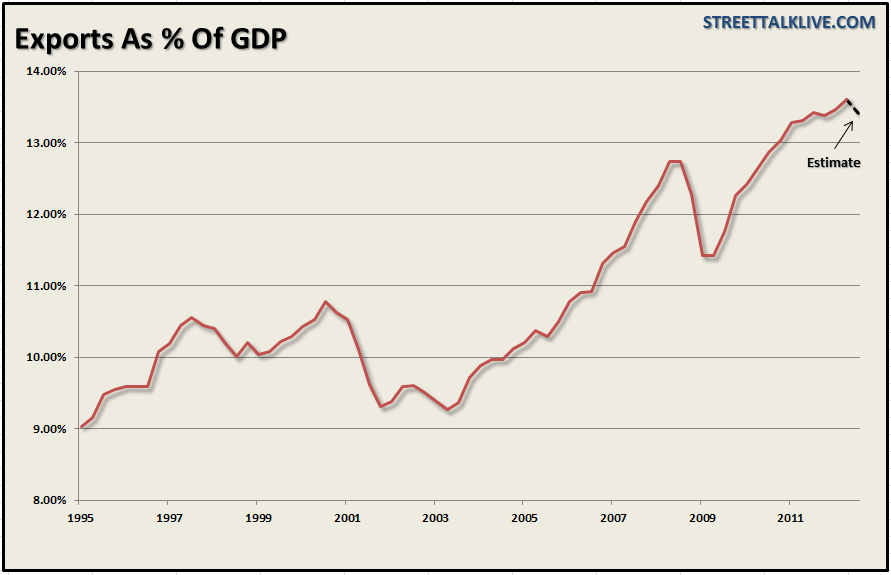
Importantly, the decline in exports was led by a $2.4 billion drop in industrial supplies. Almost half of that decrease came from a drop in exports of nonmonetary gold and is a likely culprit of international financial transactions. The bigger concern, however, which are more reflective of end user consumption was seen in declines of automotive exports ($0.6 billion) and consumer goods ($0.4 billion). The anomaly came in capital goods which had a headline advance of $0.1 billion. However, that small gain was led by a $1.4 billion increase in civilian aircraft which offset declines in the majority of the group.
The import details really were not much better as they indicated weakness in the domestic consumer. As we discussed in our report on the NFIB survey:
"While there has been some improvement since the peak of the 'Great Recession' - poor sales still provide an overriding concern for U.S. businesses when it comes to making decisions to increase employment or expand operations. While the concern over 'poor sales' remained stagnant last month the number of businesses saying this is a 'good time to expand' fell from 5 to 4 and remains near the lowest levels since the end of the last recession"
Industrial supplies fell $2.1 billion with $1.4 billion of this attributed to a decline in crude oil. The recent slate of weakness in business investment showed up in capital goods, excluding autos, dipping $0.6 billion. However, sub-prime auto loans, and 0% financing, helped keep auto imports in the black with a $0.5 billion monthly increase. 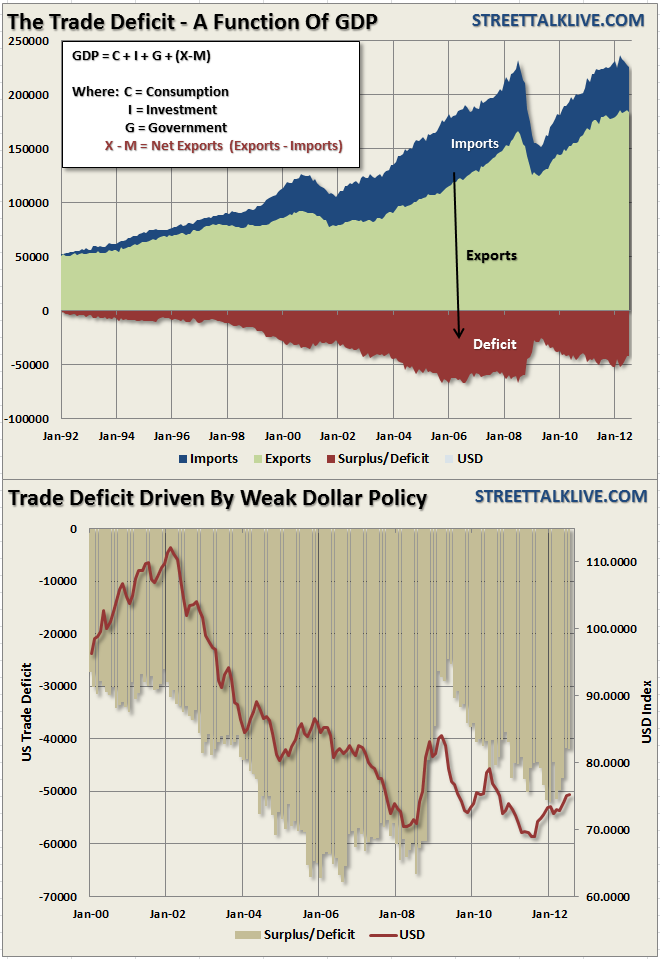
Despite the recent report - the trade deficit has improved since the beginning of the year due to a stronger dollar. The continuation of the Eurocrisis has created a capital flight into the US dollar for "safety." However, since July, the strong dollar trend has reversed on the announcement by the ECB "do whatever is necessary" to save the Eurozone. Therefore, the trade deficit will increase in the next couple of months as the dollar weakens making imports more expensive for already cash strapped consumers.
Trade Deficit Points To A Recession?
Overall, manufacturers are dealing with recession in Europe, slower growth in Asia and higher oil prices during the last month which will push the deficit wider. The increase in the deficit will subtract from GDP in the final release of Q2 later this month which is currently at a weak 1.7% annual growth rate.
The slowing rate of growth in both imports and exports is what is troubling relative to the overall economy. With exports now making up such a large percentage of GDP, and imports reflecting a weak consumer, the implications are for continued weakness in GDP. The chart below shows the year-over-year change in imports and exports. Historically speaking, when both imports and exports have declined in unison it has indicated the onset of a recession. The continued rounds of stimulative action from the Fed have slowed the rate of decline, however, both are close to moving into negative territory. 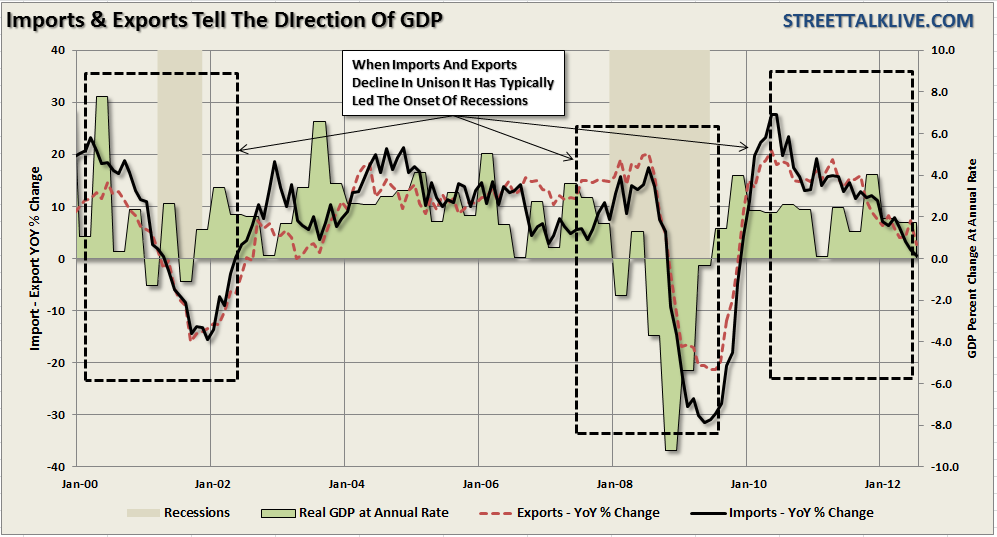
Lastly, the recent trade report does not provide much support for the economic and stock market bulls. As we have stated many times - the current fundamental and economic backdrops are not supportive of asset prices at current levels. As we discussed in the past weekend's missive:
"This is not a healthy market by any stretch of the imagination. The recent advance has come with an increase in forward P/E’s to 16.35 times earnings by the end of 2013. Since June 30th there has been in excess of a 2 point increase multiples for every quarter between now and the end of 2013. This has been driven by deteriorating earnings and not a sign of a healthy market. 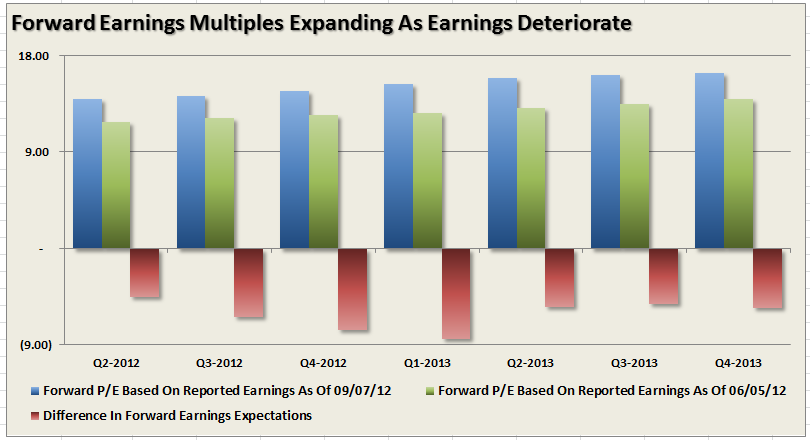
The chart above shows the quarter over quarter change in P/E's based on forward earnings. Between June 30th and the first week of September earnings, and forward expectations, have continued to deteriorate. This is just over a two month period.
In January market analysts were pounding the table on the "cheapness" of the market based on forward earnings' expectations. Since then those expectations have plummeted as markets have advanced in hopes of more stimulative action from the Fed. If we step back to January 1st of this year we find that forward multiples have exploded. 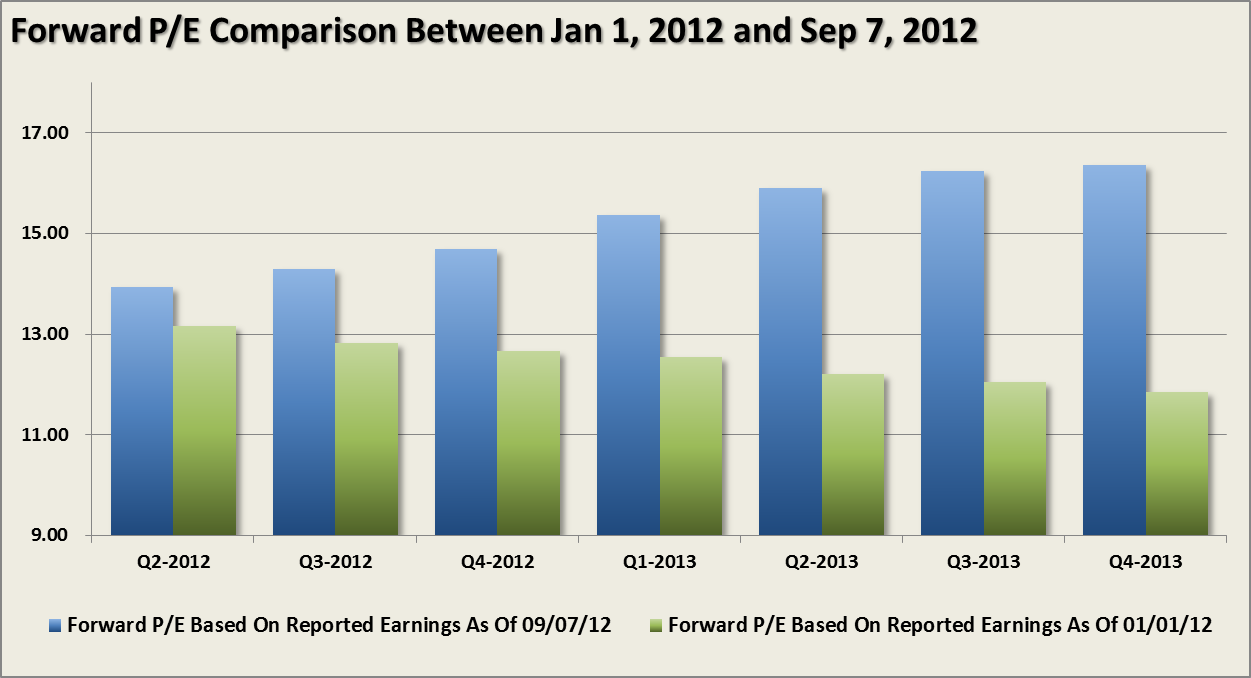
The problem with this is that a market that is expanding multiples based on increasing prices, without increasing earnings, leaves investors very susceptible to price dislocations when excesses are reverted.
So, keeping this in mind, while we will increase exposure to follow the technical trends of the market – the risks are very real. No one, no matter whom they are, has any idea about how a stimulus induced market will actually end – simply because we have never been in one before. The problem, as always, is determining whether chasing returns in the short term will offset the risks of the eventual corrective process."
This is not a market environment to be complacent in. While markets have advanced on the "hope" of continued bailouts and accommodative actions - the risks of a dislocation at some point in the future have increased.
- English (UK)
- English (India)
- English (Canada)
- English (Australia)
- English (South Africa)
- English (Philippines)
- English (Nigeria)
- Deutsch
- Español (España)
- Español (México)
- Français
- Italiano
- Nederlands
- Português (Portugal)
- Polski
- Português (Brasil)
- Русский
- Türkçe
- العربية
- Ελληνικά
- Svenska
- Suomi
- עברית
- 日本語
- 한국어
- 简体中文
- 繁體中文
- Bahasa Indonesia
- Bahasa Melayu
- ไทย
- Tiếng Việt
- हिंदी
Trade Deficit: Exports A Major Concern
Published 09/12/2012, 12:33 AM
Updated 02/15/2024, 03:10 AM
Trade Deficit: Exports A Major Concern
Latest comments
Loading next article…
Install Our App
Risk Disclosure: Trading in financial instruments and/or cryptocurrencies involves high risks including the risk of losing some, or all, of your investment amount, and may not be suitable for all investors. Prices of cryptocurrencies are extremely volatile and may be affected by external factors such as financial, regulatory or political events. Trading on margin increases the financial risks.
Before deciding to trade in financial instrument or cryptocurrencies you should be fully informed of the risks and costs associated with trading the financial markets, carefully consider your investment objectives, level of experience, and risk appetite, and seek professional advice where needed.
Fusion Media would like to remind you that the data contained in this website is not necessarily real-time nor accurate. The data and prices on the website are not necessarily provided by any market or exchange, but may be provided by market makers, and so prices may not be accurate and may differ from the actual price at any given market, meaning prices are indicative and not appropriate for trading purposes. Fusion Media and any provider of the data contained in this website will not accept liability for any loss or damage as a result of your trading, or your reliance on the information contained within this website.
It is prohibited to use, store, reproduce, display, modify, transmit or distribute the data contained in this website without the explicit prior written permission of Fusion Media and/or the data provider. All intellectual property rights are reserved by the providers and/or the exchange providing the data contained in this website.
Fusion Media may be compensated by the advertisers that appear on the website, based on your interaction with the advertisements or advertisers.
Before deciding to trade in financial instrument or cryptocurrencies you should be fully informed of the risks and costs associated with trading the financial markets, carefully consider your investment objectives, level of experience, and risk appetite, and seek professional advice where needed.
Fusion Media would like to remind you that the data contained in this website is not necessarily real-time nor accurate. The data and prices on the website are not necessarily provided by any market or exchange, but may be provided by market makers, and so prices may not be accurate and may differ from the actual price at any given market, meaning prices are indicative and not appropriate for trading purposes. Fusion Media and any provider of the data contained in this website will not accept liability for any loss or damage as a result of your trading, or your reliance on the information contained within this website.
It is prohibited to use, store, reproduce, display, modify, transmit or distribute the data contained in this website without the explicit prior written permission of Fusion Media and/or the data provider. All intellectual property rights are reserved by the providers and/or the exchange providing the data contained in this website.
Fusion Media may be compensated by the advertisers that appear on the website, based on your interaction with the advertisements or advertisers.
© 2007-2024 - Fusion Media Limited. All Rights Reserved.
